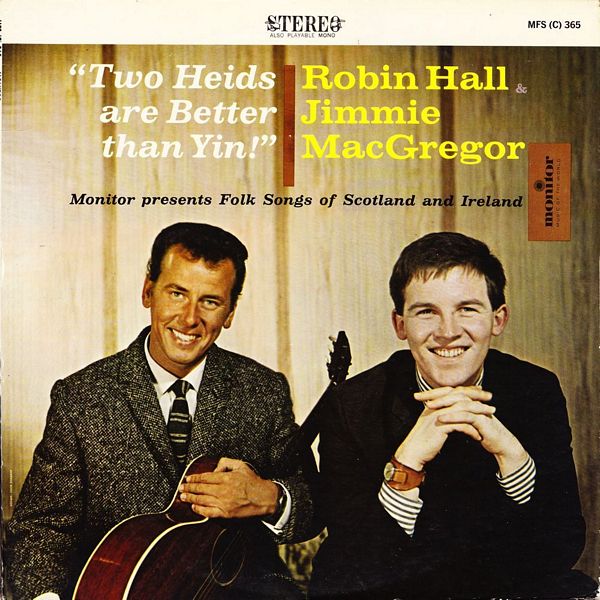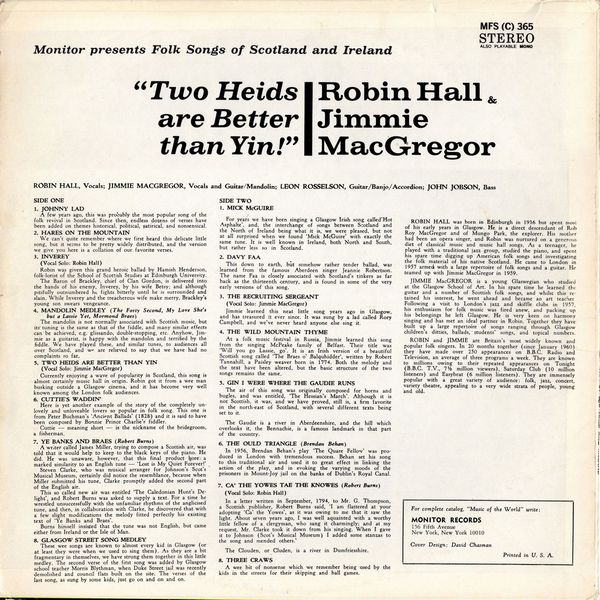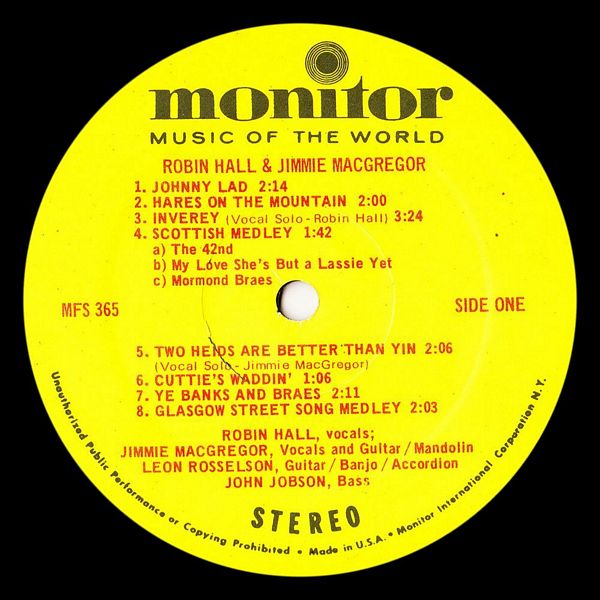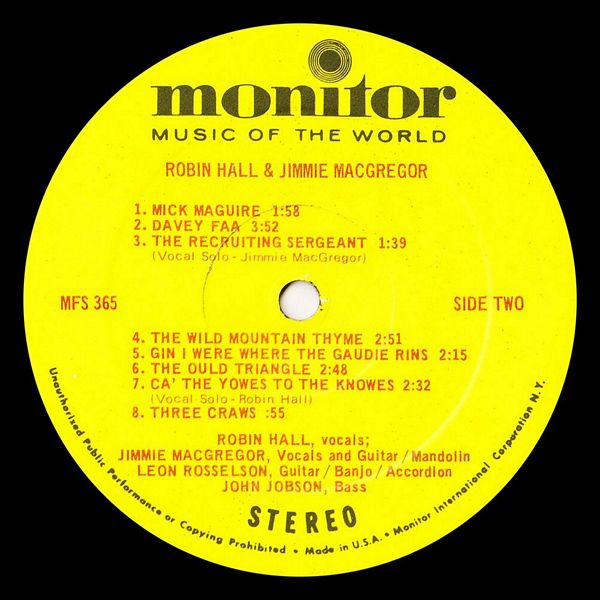

 |



|
Sleeve Notes
JOHNNIE LAD — A few years ago, this was probably the most popular song of the folk revival in Scotland. Since then, endless dozens of verses have been added on themes historical, political, satirical, and nonsensical.
HARES ON THE MOUNTAIN — Nobody quite knows where this song was first heard, as various versions are heard all over the country. The one given here is a collection of the best verses from various versions.
INVEREY — Robin was given this grand heroic ballad by Hamish Henderson, folk-lorist of the School of Scottish Studies at Edinburgh University.
The Baron of Brackley, chief of Clan Gordon, is delivered into the hands of his enemy, Inverey, by his wife Betsy, and although pitifully outnumbered he fights bitterly until he is surrounded and slain. While Inverey and the treacherous wife make merry, Brackley's young son swears vengeance.
SCOTTISH MEDLEY (The 42nd, My Love She's But a Lassie Yet, Mormond Braes) — The mandolin is not normally associated with Scottish music, but its tuning is the same as that of the fiddle, and many similar effects can be achieved, e.g. glissando, double-stopping, etc. Anyhow, Jimmie, as a guitarist, is happy with the mandolin and terrified by the fiddle. They have played these, and similar tunes, to audiences all over Scotland.
TWA HEIDS ARE BETTER THAN YIN — Currently enjoying a wave of popularity in Scotland, this song is almost certainly of music hall origin. Robin Hall first heard it from a street busker in Glasgow. It has just recently become fairly popular amongst London audiences.
CUTTIE'S WADDIN' — Here is yet another example of the story of the completely unlovely and unlovable lovers so popular in folk song. This one is from Peter Buchman's 'Ancient Ballads' (1828) and it is said to have been composed by Bonnie Prince Charlie's fiddler.
Cuttie — meaning short — is the nickname of the bridegroom, a fisherman.
YE BANKS AND BRAES — A writer called James Miller, trying to compose a Scottish air, was told that it would help to keep to the black keys of the piano. He did. He was unaware, however, that this final product bore a marked similarity to an English tune — 'Lost is My Quiet Forever'!
Steven Clarke, who was musical arranger for Johnson's Scot's Musical Museum, certainly did notice the resemblance, because when Miller submitted his tune, Clarke promptly added the second part of the English air.
This so called new air was entitled 'The Caledonian Hunt's Delight', and Robert Burns was asked to supply a text. For a time he wrestled unsuccessfully with the unfamiliar rhythms of the anglicised tune, and then, in collaboration with Clarke, he discovered that with a few slight modifications the melody fitted perfectly his existing text of 'Ye Banks and Braes'. Burns himself insisted that the tune was not English, but came either from Ireland or the Isle of Man.
GLASGOW STREET SONG MEDLEY — These songs are known to almost every kid in Glasgow (or at least they were when Robin and Jimmie used to sing them). As they are a bit fragmentary in themselves, they have strung them together in this little medley. The second verse of the first song was added by Glasgow school teacher Morris Blythman, when Duke Street jail was recently demolished and council flats built on the site. The verses of the last song, as sung by some kids, just go on and on and on. MICK MAGUIRE For years Robin and Jimmie have been singing a Glasgow Irish song called 'Hot Asphalt', and the interchange of songs between Scotland and the North of Ireland being what it is, they were pleased, but not at all surprised, when they found 'Mick Maguire' with exactly the same tune. It is well known in Ireland, both North and South, but rather less so in Scotland.
DAVEY FAA — This down to earth, but somehow rather tender ballad was learned from the famous Aberdeen singer Jeannie Robertson. The name Faa is closely associated with Scotland's tinkers as far back as the thirteenth century, and is found in some of the very early versions of this song.
THE RECRUITING SERGEANT — Jimmie learned this neat little song years ago in Glasgow, and has treasured it ever since. It was sung by a lad called Rory Campbell, and Robin and Jimmie have never heard anyone else sing it.
THE WILD MOUNTAIN THYME — At a folk music festival in Russia, Jimmie learned this song from the singing McPeake family of Belfast. Their title was 'Will you go Lassie, go'. It is an Irish version of a beautiful Scottish song called 'The Braes o' Balquhidder', written by Robert Tannahill, a Paisley weaver born in 1774. Both the melody and the text have been altered, but the basic structure of the two songs remains the same.
GIN I WERE WHERE THE GAUDIE RINS — The air of this song was originally composed for horns and bugles, and was entitled, 'The Hessian's March'. Although it is not Scottish, it was, and Robin and Jimmie have proved, still is, a firm favourite in the north-east of Scotland, with several different texts being set to it.
The Gaudie is a river in Aberdeenshire, and the hill which overlooks it, the Bennachie, is a famous landmark in that part of the country.
THE OLD TRIANGLE (Brendan Behan) — In 1956, Brendan Behan's play 'The Quare Fellow' was produced in London with tremendous success. Behan set his song to this traditional air and used it to great effect in linking the action of the play and in evoking the varying moods of the prisoners in Mount-Joy jail on the banks of Dublin's Royal Canal.
Jimmie is very proud of the guitar accompaniment.
CA' THE YOWES TO THE KNOWES — In a letter written in September, 1794, to Mr. G. Thompson, a Scottish publisher, Robert Burns said 'I am flattered at your adopting 'Ca' the Yowes', as it was owing to me that it saw the light. About seven years ago, l was well acquainted with a worthy little fellow of a clergyman, who sang it charmingly; and at my request, Mr. Clarke took it down from his singing. When I gave it to Johnson (Scot's Musical Museum) I added some stanzas to the song and mended others'. The Clouden, or Cluden, is a river in Dumfriesshire.
THREE CRAWS — This song, Robin and Jimmie can remember using when they were children whilst skipping and playing ball games in the streets.
ROBIN HALL was born in Edinburgh in 1936 but spent most of his early years in Glasgow. He is a direct descendant of Rob Roy Macgregor and of Mungo Park, the explorer. His mother had been an opera singer and Robin was nurtured on a generous diet of classical music and music hall songs. As a teenager, he played with a traditional jazz group, studied the piano, and spent his spare time digging up American folk songs and investigating the folk material of his native Scotland. He came to London in 1957 armed with a large repertoire of folk songs and a guitar. He teamed up with Jimmie Macgregor in 1959.
JIMMIE MACGREGOR is a young Glaswegian who studied at the Glasgow School of Art. In his spare time, he learned the guitar and a number of Scottish folk songs, and whilst this retained his interest, he went ahead and became an art teacher. Following a visit to London's jazz and skiffle clubs in 1957, his enthusiasm for folk music was fired anew and packing up his belongings he left Glasgow. He is very keen on harmony singing and has met an ideal partner in Robin. Together they have built up a large repertoire of songs ranging through Glasgow children's ditties, ballads, students' songs, and topical numbers.
ROBIN and JIMMIE are Britain's most widely known and popular folk singers. In 20 months together (since January 1960) they have made over 250 appearances on B.B.C. Radio and Television, an average of three programmes a week, They are known to millions owing to their repeated appearances on Tonight (B.B.C. T.V., 7 1/2 million viewers), Saturday Club (10 million listeners) and Easybeat (6 million listeners). They are immensely popular with a great variety of audiences: folk, jazz, concert, and variety theatre, appealing to a very wide strata of people, young and old.